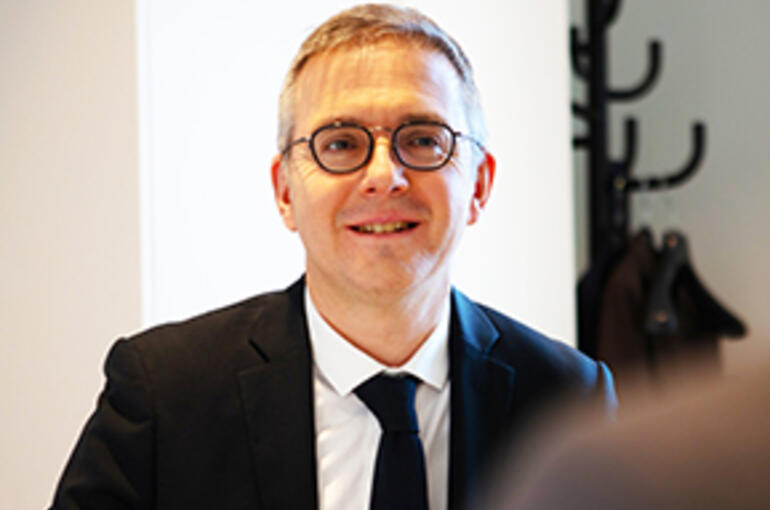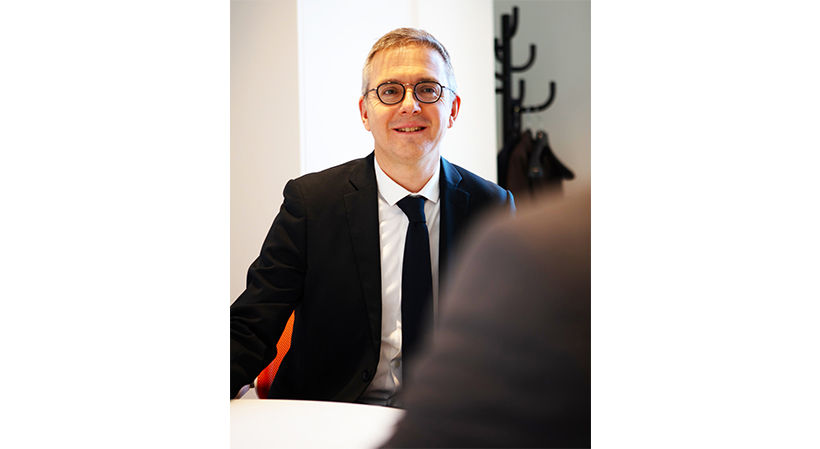- FR
- EN

In a career spanning more than 25 years, Eric Lecoeur has held several positions at SCOR, including Group Chief Actuary since 2004. On February 5, 2019, InsuranceERM magazine named him Chief Actuary of the Year. Interview below.
Eric Lecoeur in his office in Paris
InsuranceERM has just named you Chief Actuary of the Year. Why is this prize important to you?
Eric Lecoeur - Let me begin by saying that I was very touched by this award, for several reasons. Firstly, it rewards the hard work and discipline of all of SCOR’s teams throughout the world who contribute to the Group’s success every day. SCOR has always considered actuarial science to be a key component of its business model. To illustrate this, I should point out that five of the nine members of the Executive Committee are actuaries or have had actuarial training.
The second reason is more personal. This award recognizes the actuarial training I received both at the Sorbonne and more specifically at ISUP (Institut de Statistique de l’Université de Paris). France has excellent training programs that are recognized throughout the world, but tend to be overlooked at home. France was a pioneer in the field of statistics: in 1922 the mathematician Emile Borel, father of metric spaces and probability theory, founded ISUP. In 2015, the Sorbonne’s mathematics program took fifth place in the prestigious Shanghai ranking. That’s a fantastic achievement for the French university system.
Finally, when I received this award, I thought of Jean-Luc Besson, who was my mentor when I was a student at ISUP and who had joined SCOR with Denis Kessler in 2002 as Chief Risk Officer. It is in part thanks to him that I won this award and I am also grateful to Denis Kessler for the trust he has placed in me.
You have been Chief Actuary at SCOR since 2004. Can you describe your career path?
EL – I joined SCOR in 1995 after initally working in direct insurance. I have held various positions since then, in pricing, reserving, modeling, auditing and IT development. SCOR enabled me to spend five years in London as Chief Actuary of SCOR UK Limited. Through that experience, I was able to obtain an English actuarial diploma which I can now use to certify reserves in most countries. Due to that, I think I was one of the first foreign actuaries to certify reserves in Australia. During my time as an expatriate, I also realized that actuarial training programs in France and in English-speaking countries are actually very complementary. That’s why I have hired English and Canadian actuaries into my Paris teams.
It was when I was in London that I realized the actuarial profession is not so well recognized in France, even though insurers and reinsurers depend on it to function properly. In London, my wife was considered “the actuary’s wife”, whereas when we returned to Paris, I went back to being “the pharmacist’s husband”.
Why do you think the actuarial profession has been little-known in France for so long?
EL - I think the reason stems principally from actuaries themselves. For a long time, training programs produced few actuaries. The profession intentionally restricted the number of actuaries and thereby kept salaries high! In addition, “actuary” is not a registered title in the same way as “doctor”, “pharmacist”, or “engineer”. Anyone can call themselves an actuary. In France, the only way to be truly recognized as an actuary is to be a member of the Institute of Actuaries (Institut des Actuaires). This is not a registered title, but it is recognized, because you have to complete a specific university program with a very comprehensive syllabus to become a member. The world has become more complex and needs to be modeled, and company leaders have realized that actuaries are the men and women to do this.
If you had to summarize your role in one sentence, what would you say?
EL - I make sure that there is an independent assessment of the match between SCOR’s liabilities and its commitments. I think that sums up my job pretty well.
How has the actuarial profession changed in recent years?
EL - The actuarial profession has obviously changed a lot since I started my career in 1992. Technological innovation and digital technologies have had a major impact on our work. In a few decades, we have moved from punchcards to incredibly powerful computers. That has been a true paradigm shift.
In this regard, I’m still fascinated by the fact that the Apollo 11 spacecraft had two computers on board that weighed 32 kg each and had 4 kB of RAM, whereas today all of that memory could fit on a simple memory stick.
The second major change, in my opinion, has been the expansion of the risk universe combined with ever more risk aversion. New technologies have brought new risks, which we haven’t really mastered yet. Cyber-risks are an example. To respond to these new challenges, we need to be creative, particularly in terms of modeling.
What are the main challenges facing the actuarial profession in the future?
EL – To cope with the expanding risk universe and the increasing aversion to risk, new models have been created, and they must be used properly. A model is only a representation, an approximation of reality. Every new model must have its own governance. A new branch of enterprise risk management (ERM) — Model Risk Management —is most likely going to develop. It will accompany the model at every step in its lifecycle, from design to deactivation. When you don’t have a way to manage model risk, catastrophes can occur. This is what happened on January 28, 1986. 73 seconds after blast-off, the Space Shuttle Challenger disintegrated. NASA’s model estimated the probability of such a catastrophe at 1/100,000, corresponding to a VAR of 99.999%. The engineers, however, using more intuitive methods, estimated the probability at 1/200, i.e. a VAR of 99.5%, because they had doubts about the effects of the cold on O-ring seals. The O-rings had been identified as a “critical 1” level component, which meant that if they didn’t function optimally, the spacecraft and its crew would be endangered. This incident demonstrates how important expert opinions and common sense are. You can’t just blindly trust a model.
Does actuarial science have a bright future, and what advice would you give to a young person wanting to pursue a career in the field?
EL - Actuarial science is a profession for the future. To understand this, you only have to read the Villani-Torossian report submitted to the French Minister for Education in February 2018: “21 measures for teaching mathematics” (“21 mesures pour l’enseignement des mathématiques”). The report states: “Artificial intelligence, modeling, digital simulation, process optimization and massive data processing are pervading our world. They make use of fundamental and applied mathematics that require a high level of expertise.” Actuarial degree programs have always focused on teaching theoretical mathematics to a high level, but without neglecting their applications.
As for the advice I would give to young person wanting to pursue a career in actuarial science, I would say never stop learning and don’t hesitate to go abroad to supplement your academic training or as part of your career development.
